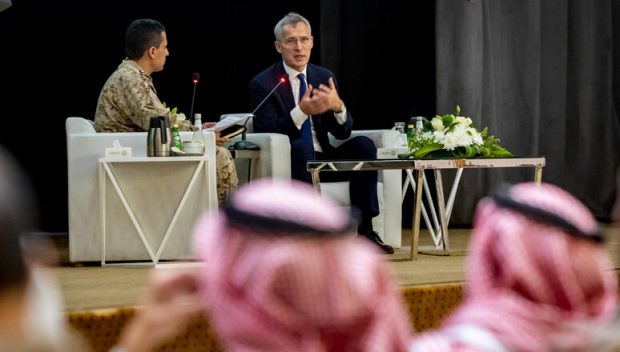Saudi Arabia, NATO review security, stability cooperation; Stoltenberg lauds Saudi leadership role

RIYADH: Secretary General Jens Stoltenberg has welcomed the development of closer ties and cooperation across several areas between NATO and Saudi Arabia.
Over phone talks with Saudi Defense Minister Prince Khalid bin Salman Al Saud, Stoltenberg underlined Saudi Arabia’s leading role in the Arab and Muslim world.
The talks reviewed areas of cooperation and joint efforts that contribute to enhancing regional and international security and stability. The talks also covered topics of shared interest, the Saudi Press Agency (SPA) reported.
Stoltenberg, who made history by becoming the first sitting NATO Secretary General to visit Saudi Arabia, said he looked forward to the possibility of developing dialogue and cooperation in areas like maritime security and freedom of navigation, the protection of critical infrastructure, and the fight against terrorism.
Stoltenberg said he had extended an invitation to visit NATO headquarters in Brussels in early 2024 and that Prince Khalid accepted it.
During his two-day visit to Saudi Arabia, Stoltenberg also met with Deputy Foreign Minister Waleed A. Al Khereiji and the Chairman of the General Staff of the Armed Forces, Air Chief Marshal Fayyadh Al Ruwaili.
He also had talks with Jasem Mohamed Al Budaiwi, the Secretary General of the Gulf Cooperation Council (GCC), the Riyadh-based council of the six GCC countries – Bahrain, Kuwait, Oman, Qatar, Saudi Arabia and the United Arab Emirates.
Stoltenberg also engaged in an open discussion at the Saudi Armed Forces and Staff College, visited the headquarters of Saudi Arabian Military Industries (SAMI) where he met with Chief Executive Officer Walid Abu Khaled.
The NATO Secretary-General exchanged views with a group of policy makers, think tank experts and media in a meeting hosted by Dr Abdulaziz Sager, Chairman of the Gulf Research Centre (GRC).
The GRC conducts scholarly research on all aspects of the wider strategic Gulf region, including the GCC countries as well as Iran, Iraq and Yemen.

























































